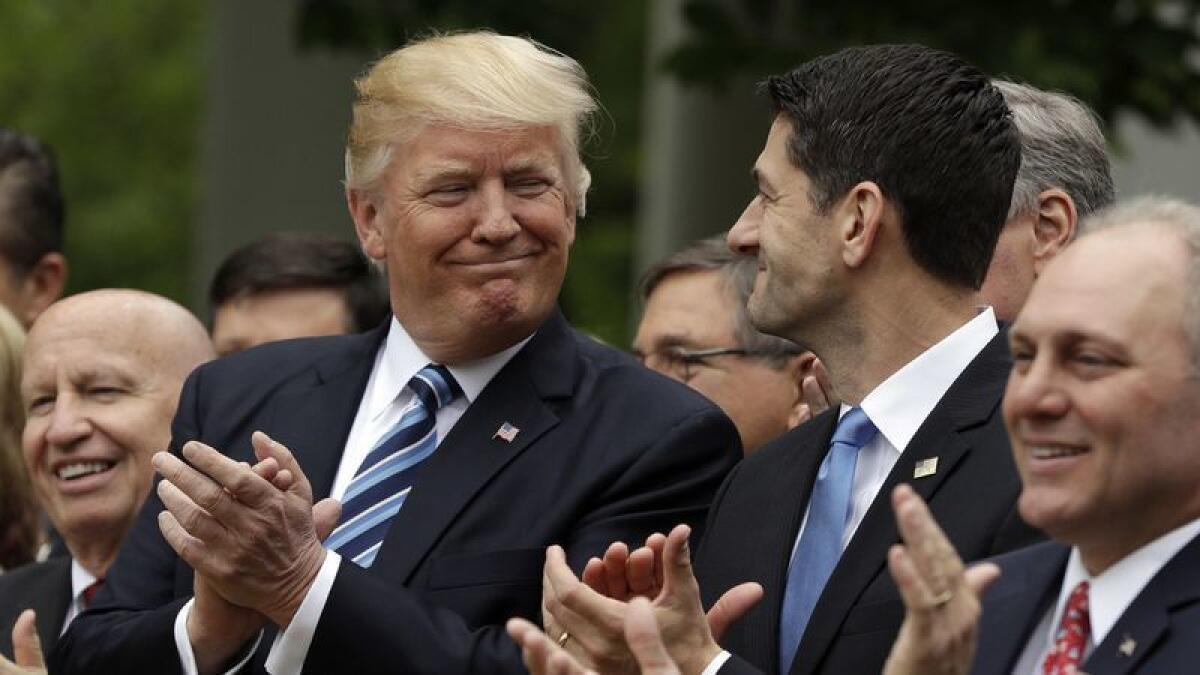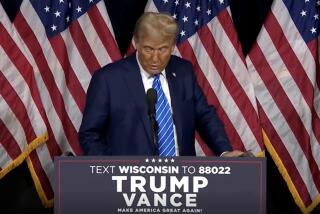Trump officials tell one court Obamacare is failing and another it’s thriving

Reporting from Washington — As they push a federal court to repeal the Affordable Care Act, Trump administration lawyers are arguing the law is no longer workable because Congress eliminated a penalty on people who don’t have health insurance.
But for months, senior administration officials and lawyers have been making the exact opposite case in other settings, a review of government reports, court filings and public statements made by Trump appointees shows.
In fact administration officials, including White House economists, this year repeatedly have hailed the strength of insurance marketplaces created by the 2010 law.
And in stark contrast to their claims in federal court in New Orleans, they have stressed that the 2017 legislation eliminating the so-called mandate penalty has had little to no impact on markets and consumers, let alone on the broader healthcare law, often called Obamacare or the ACA.
“Another year of stable enrollment,” Seema Verma, who oversees the marketplaces as administrator of the Centers for Medicare and Medicaid Services, crowed in March after the agency released a report showing 11.4 million people signed up for coverage on the marketplaces for 2019.
That was down only slightly from the 11.8 million consumers who signed up for 2018, before repeal of the mandate penalty took effect.
It’s unclear whether stable enrollment figures and statements from Verma and other administration officials will affect how the U.S. 5th Circuit Court of Appeals views the latest challenge to the healthcare law. The suit, brought by Texas and a group of other Republican-led states, threatens to strip health insurance from tens of millions of Americans and roll back the law’s protections for Americans with preexisting medical conditions.
University of Michigan law professor Nicholas Bagley, who has closely tracked litigation related to the healthcare law, said federal courts are usually reluctant to pry too deeply into inconsistencies in how government officials justify their actions.
The Trump administration, however, is testing the limits of this restraint, he said. “Courts can get pushed to the point where they say this is too much to swallow.”
A hearing in the healthcare case — Texas vs. U.S. — is scheduled for Tuesday.
The hearing follows a controversial decision in December by a federal judge in Texas, who stunned many conservative and liberal legal experts by backing the lawsuit to invalidate the law.
The judge, a well-known conservative appointed by President George W. Bush, ruled the healthcare law couldn’t function without the mandate and therefore should be scrapped.
But the enrollment data and assurances from Trump administration officials that markets are healthy have all come to light since that ruling and appear to undercut the claims now being made in New Orleans by the Republican states and the Trump administration.
In February, for example, the White House Council of Economic Advisors issued a report that concluded deregulating health insurance – by eliminating the mandate and loosening requirements on health insurers -- would not harm insurance markets.
“Deregulatory reforms should not be expected to destabilize the market for ACA-compliant insurance,” wrote the panel of economists appointed by Trump. “The common argument that the individual mandate is valuable is misguided.”
In March, Verma delivered a speech to the Federation of American Hospitals celebrating data showing prices for health plans on the marketplaces were falling in 2019.
“For the first time ever, after a history of double-digit increases for years, premiums have declined,” she said.
And the same month, in a federal court in Maryland, lawyers at the Justice Department highlighted the stability of the marketplaces, or exchanges as they are sometimes called.
“Monthly premiums for individual market plans … generally decreased in 2019,” the administration attorneys argued in a motion urging dismissal of a lawsuit that accuses the Trump administration of deliberately sabotaging the healthcare law.
“Those same exchanges saw an increase in individual market insurers, compared to 2018, which means more consumer choices and healthier competition among issuers,” the administration attorneys continued.
The lead Justice Department lawyer on the motion was Assistant Atty. Gen. Joseph H. Hunt, whom Trump tapped last year to oversee the department’s civil division.
Less than two months after making that argument, however, Hunt argued something very different to the federal appellate court in New Orleans.
The Trump administration changed its position after initially deciding not to support the effort by several Republican state attorneys general to throw out the whole health law.
In court papers filed in May, Justice Department lawyers, including Hunt, urged the 5th Circuit to strike down the whole law because they said it couldn’t stand without the mandate penalty.
“The ACA’s provisions were highly interdependent,” the federal attorneys wrote, noting the connection between the insurance mandate and the consumer protections, such as the ban on insurers turning away sick consumers.
“Once those core provisions are excised, the balance of the ACA cannot continue to operate as intended.”
Justice Department spokeswoman Kelly Laco said the department wouldn’t comment on the apparent inconsistencies in the administration’s position.
The Trump administration lawyers are drawing on arguments that the architects of the healthcare law made in 2009 and 2010: that a penalty was critical to getting young and healthy consumers to buy health plans and offset the costs of covering older and sicker Americans.
But over the last decade, most healthcare experts, seeing how the marketplaces have actually worked, have revised their view about the importance of having a penalty to ensure a stable market.
And there is now widespread agreement that the healthcare law’s system of providing generous subsidies to low- and moderate-income consumers to help them buy coverage is enough to bring millions of people into the markets.
“In an insurance market that guarantees access to people with preexisting conditions, there need to be both carrots and sticks to encourage healthy people to sign up for coverage and keep the market stable,” said Cynthia Cox, who studies insurance markets at the nonprofit Kaiser Family Foundation. “It turns out, if the carrot is large enough, the stick is less important.”
The White House Council of Economic Advisors echoed this conclusion in its February report.
“The premium subsidies stabilize the ACA exchanges,” the administration economists said.
More to Read
Get the L.A. Times Politics newsletter
Deeply reported insights into legislation, politics and policy from Sacramento, Washington and beyond. In your inbox three times per week.
You may occasionally receive promotional content from the Los Angeles Times.











